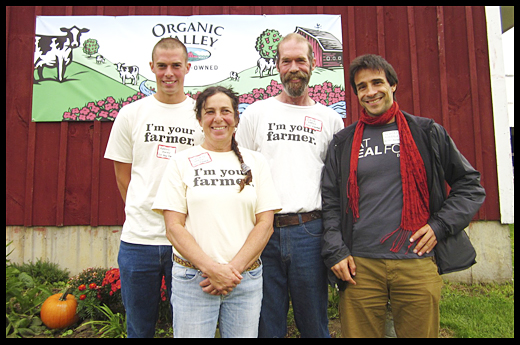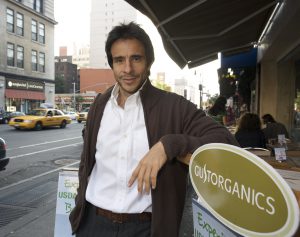by guest blogger Alberto Gonzalez, founder and CEO of GustOrganics.
This is a fundamental question that, in an ideal world, we’d all be able to answer.
Knowing your farmer is about understanding his or her practices, motivations, challenges and ideas, but it’s also about transparency. Transparency in agriculture means better practices, and better practices results in better food. I truly believe that if all Americans were able to meet their farmers, we would have a much healthier population and society.
I am fortunate enough to have met many of the lovely farmers who provide the organic meats, dairy, and produce for my restaurant, GustOrganics. And a few weeks ago, I got an invitation from Organic Valley to meet organic dairy farmers Susan, Aaron, and David Hardy on their farm in Mohawk, NY.
I completely understand that most people don’t have the chance to personally meet their farmers and visit their farms; therefore, I decided to ask the Hardy family some questions and share their answers here with you. —Alberto Gonzalez
Would you say you are a farmer or you work as one?
Susan: I am a farmer! Farming is our life, not just a job to us. We live with the land, we work with the land, we take care of the land, and it is in our souls. It is who we are. It has been wonderful to bring up our family on the farm and to raise our kids that way.
Why did you go organic?
David: There are a couple of reasons. When I was younger, I went to college and learned the conventional way of farming. Then, in the mid-’80s I started reading this magazine called The New Farm (a Rodale Institute publication), and it opened my eyes to a whole new way of farming. In 1992, we bought this farm, and 1994 we started our new adventure as dairy farmers. We wanted to go the organic route because we didn’t like chemicals and we didn’t want herbicides—we like pasture. We particularly like the concept of rotational pasture because grazing is a more natural way of farming—it’s more sustainable and better for the cows’ health. If the soil and the grass are healthy, the cow, the milk, and the people are healthy. Going organic was something that came naturally.
What made you join Organic Valley Coop?
David: Because it is a farmer-owned and farmer-run coop. Everyone from top to bottom is farm-related or an active farm member. And everyone on the board of directors is an active farm member. So everyone has input. In regional meetings, all the farmers gather and share their experiences, and we learn and change based on that dialog. Organic farming is a community and Organic Valley is one big community.
Biodiversity by Dr. Guy Jodarski, Staff Veterinarian at Organic Valley from GustOrganics on Vimeo.
Are family farms better? If so, why?
Susan: We definitely feel family farms are better. We would not have chosen any other way to bring up our kids and we think it teaches good work ethics.
David: Family farms are boots-on-the-ground rather than suit-and-tie kind of operations. Farming is a 365-day-a-year commitment, milking is a twice-a day-job, and each person contributes his or her time.
In a few words, what do you think about America’s food system?
David: The food system is controlled by a few large corporations, and what they pay the average farmer in the conventional world has been very stagnant for the past 30 years. I think this is one of the reasons why conventional farms are so huge, because of the economies of scale. But as you get larger, you lose the localness and the connection to the land and the connection to the people who are buying your food. I think, if the corporations would improve the average pay of the conventional farmer, more farmers would change their practices to be more sustainable.
Is your farm sustainable?
David: We are a sustainable farm. We are an all-grass-based dairy farm. We are conserving soil all the time, and we are building organic matter all the time. During times of excess rain, our soil keeps absorbing water and during the dry periods like this past summer, our pastures stay green, which is a testament to the resilience and the moisture-holding capacity of our soil. The longevity of our cows also speaks to sustainability. The average age of our cows is about 11 or 12 years old. In a conventional dairy farm, the average age of the cows is about 3.5 years.
Susan: I have 3 sons and 70 daughters [in obvious reference to her cows].
Susan Hardy and her cow’s names from GustOrganics on Vimeo.
What kind of food do you eat?
Susan: We grow our own food. We raise beef, pork, and chicken. We have a large vegetable garden, and we pick apples and berries. We bake our own bread with organic flour from the local coop. We also produce our own eggs and, of course, milk. During the whole year, we buy about 20 percent of our food from the store and 80 percent we produce ourselves.
What does happiness mean to you?
Susan: Working together and with my kids makes me very happy; having people like you with an encouraging vision and perseverance to see your vision through makes me happy, too. Making a difference in the world also makes me happy. Having my family together at the table, sharing conversation and food, and having that food be all homegrown/homemade and taking a moment to realize and appreciate that—it’s quite a feeling of satisfying accomplishment. I know that we have educated our children with strong work ethics and there is a ripple effect of that education, passing on an understanding of how important organic is (literally) from the ground up.
So, while only in an ideal world everyone can shake hands with their farmer and visit their farm, we can all make an effort to know how our food is produced. To me, there’s nothing at all idealistic about that. —A.G.
Alberto Gonzalez is the founder and CEO of GustOrganics, the world’s first certified-organic restaurant using 100% organic ingredients, and one of the greenest and most progressive restaurants on the planet, www.gustorganics.com.






I appreciate Susan’s sentiment, “I know that we have educated our children with strong work ethics and there is a ripple effect of that education, passing on an understanding of how important organic is (literally) from the ground up.”
Volunteering for Westport, CT’s Wakeman Town Farm, we are working toward creating an educational center that teaches our community how to grow their own food and support local, organic farmers. It’s inspiring to see this movement take hold in our town, and to see families buy into the idea that they do, in fact, have control over the food process.
Keep up the good work,
Elizabeth Beller
Chair, Wakeman Town Farm Committee
I grew up in an area with many small family farms. We were sent up the road for fresh eggs and chicken. We picked potatoes on days off from school. We had a large vegetable garden. Most of my friends and classmates from farming families went off to college and never came back to the farm. I moved away as well. When I returned, most of the small farms were gone. We had lost a lot of land to housing developments. It is so good to see young people returning to the land. I make it a point to buy as much as I can from small family farms and encourage others to do the same. I’m glad to say that I actually do know my farmers again.